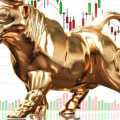As the US economy faces the possibility of a recession, investors are wondering what will happen to the stock market. Will it crash? Will it rebound? What can investors do to protect their investments? In this article, we'll explore the potential impact of a recession on the stock market and what investors can do to prepare. When it comes to recessions, stock prices tend to plummet. Marked volatility and sharp fluctuations in stock prices are common as investors react quickly to any hint of news, whether good or bad.
In a major recession, companies would record losses and the stock market would suffer. But if the recession were brief enough and there was an economic recovery soon, stocks could rebound even before bond yields began to fall. As a growing number of investment banks and company bosses warn that the likelihood of a recession is increasing, Morgan Stanley analysts tell clients that the stock market, despite being reeling from strong sales in recent weeks, has a lot of room to fall before reaching levels consistent with recessional-era lows. Despite the fact that major stock indices fell more than 20% below recent highs, markets have only fallen by about 60% of the average decline compared to previous recessions (which denote two consecutive quarters of negative GDP growth).Morgan Stanley estimates that the S&P 500 could fall to 3000 points, a 20% drop from current levels, if the US falls into recession. Because high prices deter spending by some consumers, Morgan Stanley says that stocks linked to discretionary spending, such as those in retail, hotels, restaurants and clothing, are at greater risk of falling, while those linked to the Internet, payments and durable household items (such as appliances and computers) have a lower risk. The same day Tesla CEO Elon Musk said that the US economy is “more likely to face a recession in the short term”, Goldman Sachs' chief economist Jan Hatzius said that his firm now believes that the “risk of recession” is higher and more anticipated.
Goldman Sachs estimates that tighter financial conditions could drag GDP down by 2 percentage points over the next year. Approximately 75% of those surveyed said they would reduce the number of meals out in the next six months, while 60% said they would reduce the number of meals out in restaurants. While driving much of the inflationary gains, essential items such as gasoline and food should spend more resiliently, and approximately 40% of consumers say they would reduce either. If a recession were avoided, the market could “recover sharply to its previous peaks” according to strategists. Some investors take advantage of falling markets by short-selling stocks, which means they make money when stock prices fall and lose money when they rise. However, losses from short selling are theoretically unlimited since there is no obvious limit to how much the value of a stock can rise. Deutsche Bank's view of the possibilities of a sharp decline in the stock market in the event of a recession is in line with similar predictions from other banks.
This is because markets usually peak before the start of recessions and hit bottom before their conclusion. The most important thing for investors to remember is that no one can reliably identify important changes in economic cycles in real time. Therefore, it's important for investors to be prepared for any potential downturns in the stock market. Investors should diversify their portfolios across different asset classes and industries so that they are not overly exposed to any one sector or asset class.
They should also consider investing in defensive stocks such as utilities or consumer staples which tend to perform better during recessions. It's also important for investors to stay informed about economic news and developments so they can make informed decisions about their investments. Finally, investors should consider investing in index funds or ETFs which provide broad exposure to different sectors or asset classes.


